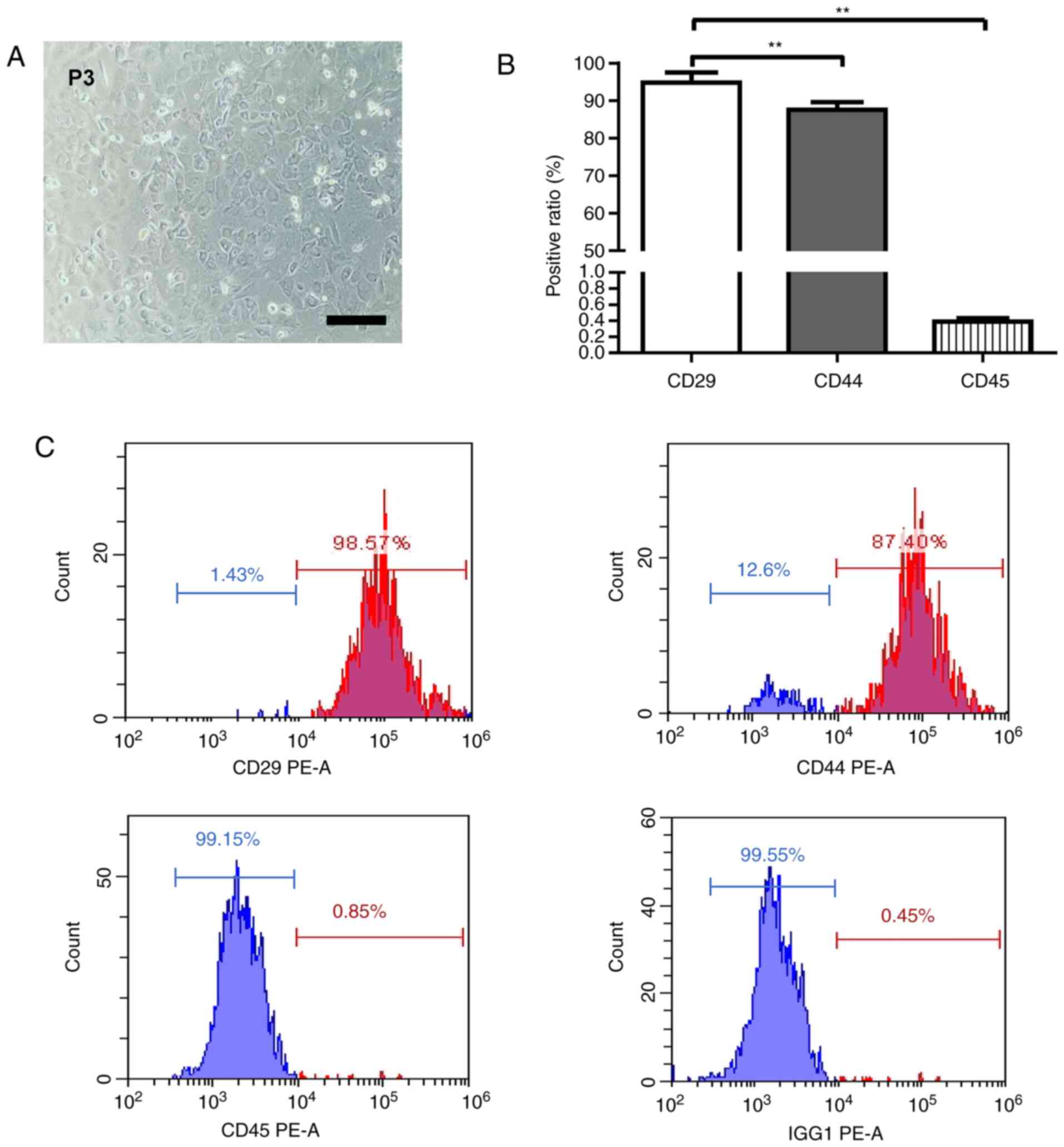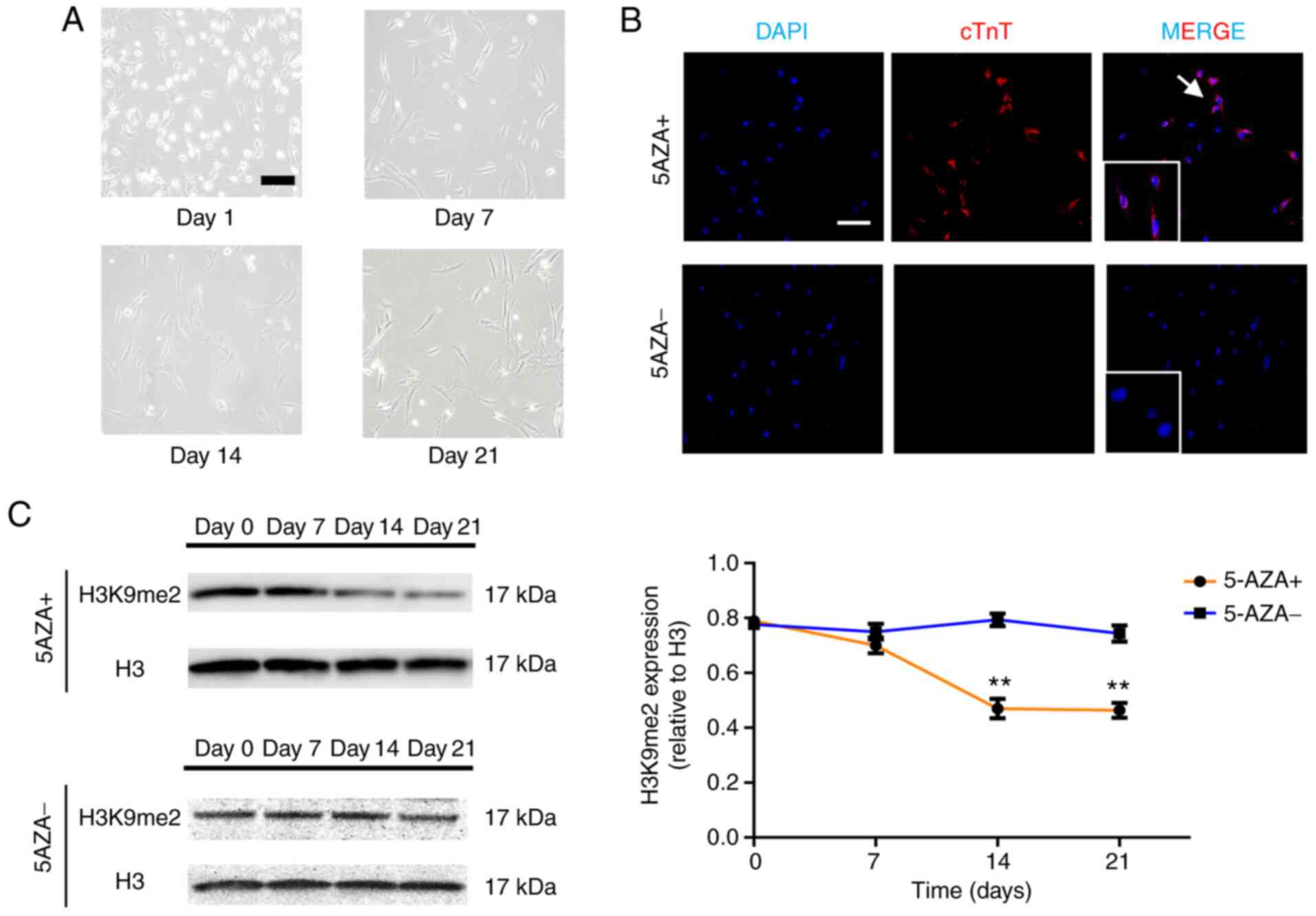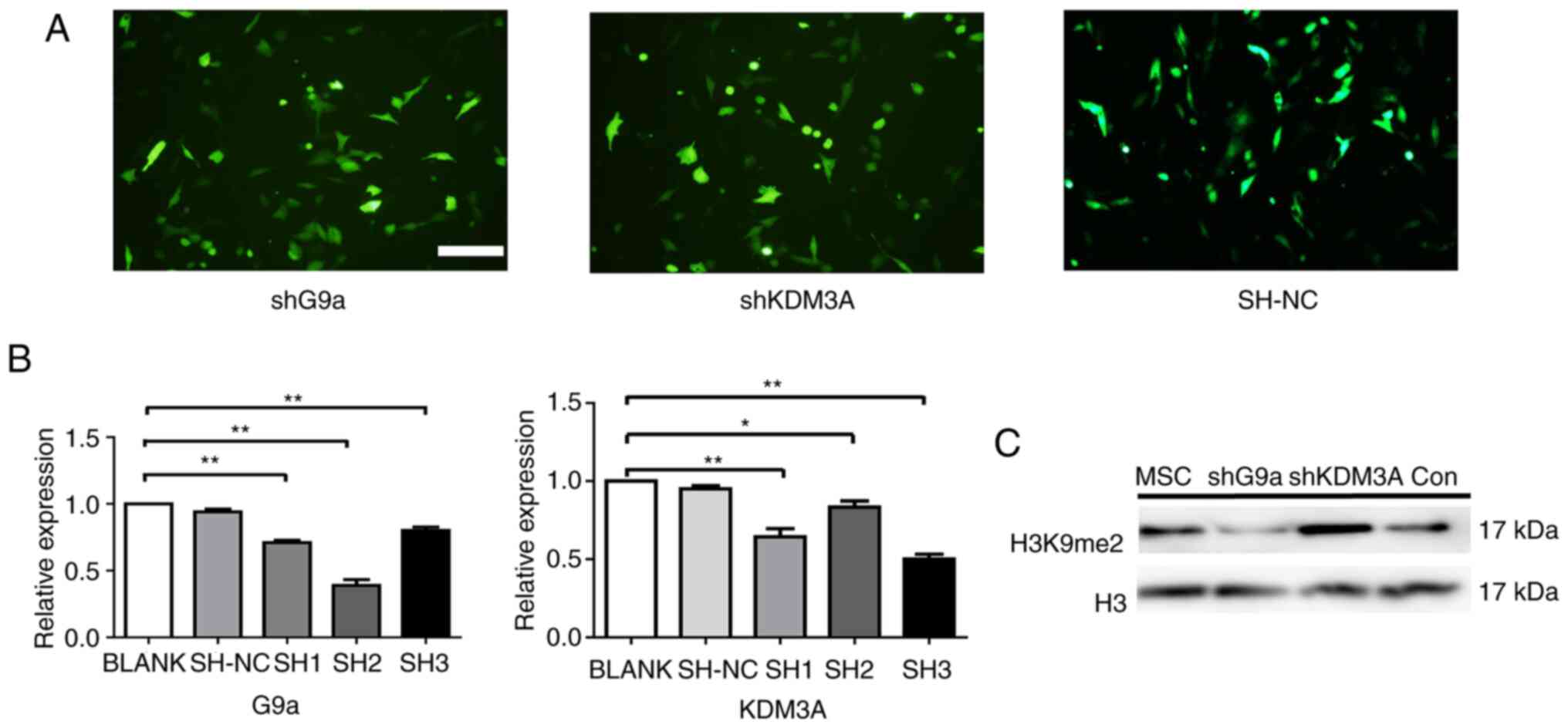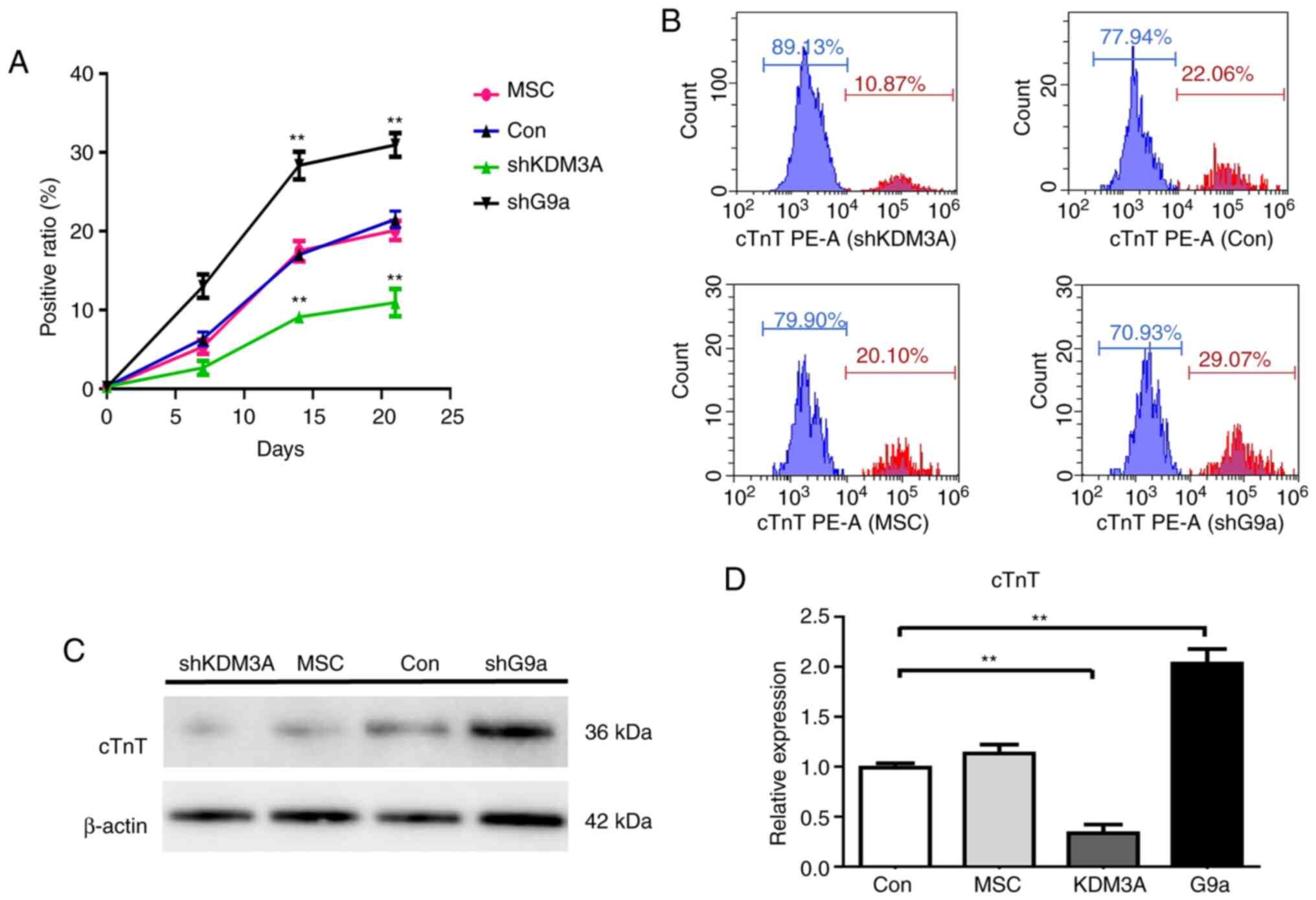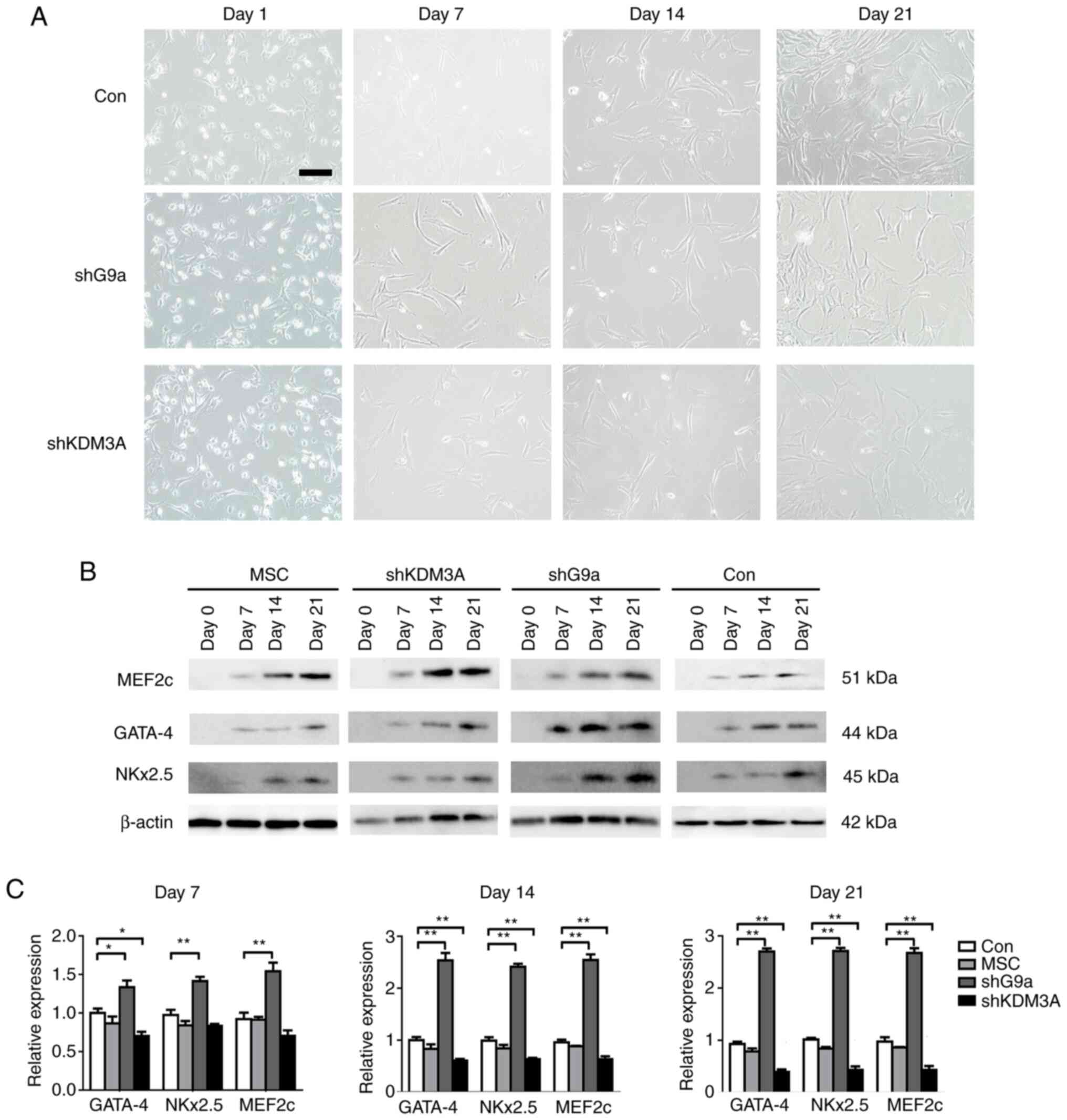|
1
|
Barstow C and McDivitt JD: Cardiovascular
disease update: Bradyarrhythmias. FP Essent. 454:18–23.
2017.PubMed/NCBI
|
|
2
|
Burns CG and Burns CE: Canonical Wnt
signaling sets the pace. Dev Cell. 50:675–676. 2019. View Article : Google Scholar : PubMed/NCBI
|
|
3
|
Bagno L, Hatzistergos KE, Balkan W and
Hare JM: Mesenchymal stem cell-based therapy for cardiovascular
disease: Progress and challenges. Mol Ther. 26:1610–1623. 2018.
View Article : Google Scholar : PubMed/NCBI
|
|
4
|
Fukuda K: Development of regenerative
cardiomyocytes from mesenchymal stem cells for cardiovascular
tissue engineering. Artif Organs. 25:187–193. 2001. View Article : Google Scholar : PubMed/NCBI
|
|
5
|
Hou J, Lü AL, Liu BW, Hou J, Xing YJ, Da
J, Hou ZL and Ai SY: Combination of BMP-2 and 5-AZA is advantageous
in rat bone marrow-derived mesenchymal stem cells differentiation
into cardiomyocytes. Cell Biol Int. 37:1291–1299. 2013. View Article : Google Scholar : PubMed/NCBI
|
|
6
|
Xu W, Zhang X, Qian H, Zhu W, Sun X, Hu J,
Zhou H and Chen Y: Mesenchymal stem cells from adult human bone
marrow differentiate into a cardiomyocyte phenotype in vitro. Exp
Biol Med (Maywood). 229:623–631. 2004. View Article : Google Scholar : PubMed/NCBI
|
|
7
|
Cheng F, Zou P, Yang H, Yu Z and Zhong Z:
Induced differentiation of human cord blood mesenchymal
stem/progenitor cells into cardiomyocyte-like cell in vitro. J
Huazhong Univ Sci Technolog Med Sci. 23:154–157. 2003. View Article : Google Scholar : PubMed/NCBI
|
|
8
|
Luo L, Tang J, Nishi K, Yan C, Dinh PU,
Cores J, Kudo T, Zhang J, Li TS and Cheng K: Fabrication of
synthetic mesenchymal stem cells for the treatment of acute
myocardial infarction in mice. Circ Res. 120:1768–1775. 2017.
View Article : Google Scholar : PubMed/NCBI
|
|
9
|
Li J, Zhu K, Wang Y, Zheng J, Guo C, Lai H
and Wang C: Combination of IGF1 gene manipulation and 5-AZA
treatment promotes differentiation of mesenchymal stem cells into
cardiomyocyte-like cells. Mol Med Rep. 11:815–820. 2015. View Article : Google Scholar : PubMed/NCBI
|
|
10
|
Saito Y, Nakamura K, Yoshida M, Sugiyama
H, Takano M, Nagase S, Morita H, Kusano KF and Ito H:
HCN4-overexpressing mouse embryonic stem cell-derived
cardiomyocytes generate a new rapid rhythm in rats with
bradycardia. Int Heart J. 59:601–606. 2018. View Article : Google Scholar : PubMed/NCBI
|
|
11
|
Gorabi AM, Hajighasemi S, Tafti HA, Atashi
A, Soleimani M, Aghdami N, Saeid AK, Khori V, Panahi Y and Sahebkar
A: TBX18 transcription factor overexpression in human-induced
pluripotent stem cells increases their differentiation into
pacemaker-like cells. J Cell Physiol. 234:1534–1546. 2019.
View Article : Google Scholar : PubMed/NCBI
|
|
12
|
Yang G, Tian J, Feng C, Zhao LL, Liu Z and
Zhu J: Trichostatin a promotes cardiomyocyte differentiation of rat
mesenchymal stem cells after 5-azacytidine induction or during
coculture with neonatal cardiomyocytes via a mechanism independent
of histone deacetylase inhibition. Cell Transplant. 21:985–996.
2012. View Article : Google Scholar : PubMed/NCBI
|
|
13
|
Singh PB, Belyakin SN and Laktionov PP:
Biology and physics of heterochromatin-like domains/complexes.
Cells. 9:18812020. View Article : Google Scholar : PubMed/NCBI
|
|
14
|
Yang J, Kaur K, Edwards JG, Eisenberg CA
and Eisenberg LM: Inhibition of histone methyltransferase, histone
deacetylase, and β-catenin synergistically enhance the cardiac
potential of bone marrow cells. Stem Cells Int. 2017:34649532017.
View Article : Google Scholar : PubMed/NCBI
|
|
15
|
Zhang QJ, Tran TAT, Wang M, Ranek MJ,
Kokkonen-Simon KM, Gao J, Luo X, Tan W, Kyrychenko V, Liao L, et
al: Histone lysine dimethyl-demethylase KDM3A controls pathological
cardiac hypertrophy and fibrosis. Nat Commun. 9:52302018.
View Article : Google Scholar : PubMed/NCBI
|
|
16
|
Huang YL, Qiu RF, Mai WY, Kuang J, Cai XY,
Dong YG, Hu YZ, Song YB, Cai AP and Jiang ZG: Effects of
insulin-like growth factor-1 on the properties of mesenchymal stem
cells in vitro. J Zhejiang Univ Sci B. 13:20–28. 2012. View Article : Google Scholar : PubMed/NCBI
|
|
17
|
Nippert F, Schreckenberg R and Schlüter
KD: Isolation and cultivation of adult rat cardiomyocytes. J Vis
Exp. 128:566342017.PubMed/NCBI
|
|
18
|
Livak KJ and Schmittgen TD: Analysis of
relative gene expression data using real-time quantitative PCR and
the 2(-Delta Delta C(T)) method. Methods. 25:402–408. 2001.
View Article : Google Scholar : PubMed/NCBI
|
|
19
|
Sun X, Li H, Zhu Y, Xu P, Zuo Q, Li B and
Gu X: 5-Azacytidine-induced cardiomyocyte differentiation of very
small embryonic-like stem cells. Stem Cells Int. 2020:51623502020.
View Article : Google Scholar : PubMed/NCBI
|
|
20
|
Thienpont B, Aronsen JM, Robinson EL,
Okkenhaug H, Loche E, Ferrini A, Brien P, Alkass K, Tomasso A,
Agrawal A, et al: The H3K9 dimethyltransferases EHMT1/2 protect
against pathological cardiac hypertrophy. J Clin Invest.
127:335–348. 2017. View
Article : Google Scholar : PubMed/NCBI
|
|
21
|
Abou-ElNaga A, El-Chennawi F, Ibrahim
Kamel S and Mutawa G: The potentiality of human umbilical cord
isolated mesenchymal stem/stromal cells for cardiomyocyte
generation. Stem Cells Cloning. 13:91–101. 2020.PubMed/NCBI
|
|
22
|
Soltani L, Rahmani HR, Daliri Joupari M,
Ghaneialvar H, Mahdavi AH and Shamsara M: Ovine fetal mesenchymal
stem cell differentiation to cardiomyocytes, effects of co-culture,
role of small molecules; reversine and 5-azacytidine. Cell Biochem
Funct. 34:250–261. 2016. View
Article : Google Scholar : PubMed/NCBI
|
|
23
|
Jain M, Minocha E, ripathy NK, Singh N,
Chaturvedi CP and Nityanand S: Comparison of the cardiomyogenic
potency of human amniotic fluid and bone marrow mesenchymal stem
cells. Int J Stem Cells. 12:449–456. 2019. View Article : Google Scholar : PubMed/NCBI
|
|
24
|
Antonitsis P, Ioannidou-Papagiannaki E,
Kaidoglou A and Papakonstantinou C: In vitro cardiomyogenic
differentiation of adult human bone marrow mesenchymal stem cells.
The role of 5-azacytidine. Interact Cardiovasc Thorac Surg.
6:593–597. 2007. View Article : Google Scholar : PubMed/NCBI
|
|
25
|
Larsen F, Gundersen G, Lopez R and Prydz
H: CpG islands as gene markers in the human genome. Genomics.
13:1095–1107. 1992. View Article : Google Scholar : PubMed/NCBI
|
|
26
|
Ruan ZB, Zhu L, Yin YG and Chen GC: The
mechanism underlying the differentiation of human umbilical
cord-derived mesenchymal stem cells into myocardial cells induced
by 5-azacytidine. Indian J Med Sci. 64:402–407. 2010. View Article : Google Scholar : PubMed/NCBI
|
|
27
|
Enright BP, Kubota C, Yang X and Tian XC:
Epigenetic characteristics and development of embryos cloned from
donor cells treated by trichostatin A or 5-aza-2′-deoxycytidine.
Biol Reprod. 69:896–901. 2003. View Article : Google Scholar : PubMed/NCBI
|
|
28
|
Choi SC, Yoon J, Shim WJ, Ro YM and Lim
DS: 5-Azacytidine induces cardiac differentiation of P19 embryonic
stem cells. Exp Mol Med. 36:515–523. 2004. View Article : Google Scholar : PubMed/NCBI
|
|
29
|
Xu H, Yi Q, Yang C, Wang Y, Tian J and Zhu
J: Histone modifications interact with DNA methylation at the GATA4
promoter during differentiation of mesenchymal stem cells into
cardiomyocyte-like cells. Cell Prolif. 49:315–329. 2016. View Article : Google Scholar : PubMed/NCBI
|
|
30
|
Gilsbach R, Schwaderer M, Preissl S,
Grüning BA, Kranzhöfer D, Schneider P, Nührenberg TG,
Mulero-Navarro S, Weichenhan D, Braun C, et al: Distinct epigenetic
programs regulate cardiac myocyte development and disease in the
human heart in vivo. Nat Commun. 9:3912018. View Article : Google Scholar : PubMed/NCBI
|
|
31
|
Wang X, Wu H, Ma J, Xu S, Li S, Bao S and
Wang F: threshold inhibition of methyltransferase G9a/Glp
exacerbates neuropathic hypersensitivity through mediating GRIN2B
methylation. Sci Insigt. 29:33–47. 2019. View Article : Google Scholar
|
|
32
|
Schones DE, Chen X, Trac C, Setten R and
Paddison PJ: G9a/GLP-dependent H3K9me2 patterning alters chromatin
structure at CpG islands in hematopoietic progenitors. Epigenetics
Chromatin. 7:232014. View Article : Google Scholar : PubMed/NCBI
|
|
33
|
Liang L, Zhao JY, Kathryn T, Bekker A and
Tao YX: BIX01294, a G9a inhibitor, alleviates nerve injury-induced
pain hypersensitivities during both development and maintenance
periods. Transl Perioper Pain Med. 6:106–114. 2019.PubMed/NCBI
|
|
34
|
Fu L, Yan FX, An XR and Hou J: Effects of
the histone methyltransferase inhibitor UNC0638 on Histone H3K9
dimethylation of cultured ovine somatic cells and development of
resulting early cloned embryos. Reprod Domest Anim. 49:e21–e25.
2014. View Article : Google Scholar : PubMed/NCBI
|
|
35
|
Qin L, Xu Y, Yu X, Toneff MJ, Li D, Liao
L, Martinez JD, Li Y and Xu J: The histone demethylase Kdm3a is
required for normal epithelial proliferation, ductal elongation and
tumor growth in the mouse mammary gland. Oncotarget. 8:84761–84775.
2017. View Article : Google Scholar : PubMed/NCBI
|
|
36
|
Almalki SG and Agrawal DK: Key
transcription factors in the differentiation of mesenchymal stem
cells. Differentiation. 92:41–51. 2016. View Article : Google Scholar : PubMed/NCBI
|
|
37
|
Cao F, Niu LL, Meng L, Zhao LX, Zheng M,
Yue W, Bai CX, Jia GL and Pei XT: Cadiomyocyte-like differentiation
of human bone marrow mesenchymal stem cells after exposure to
5-azacytidine in vitro. Shi Yan Sheng Wu Xue Bao. 37:118–124.
2004.PubMed/NCBI
|
|
38
|
Dong W, Oya E, Zahedi Y, Prasad P,
Svensson JP, Lennartsson A, Ekwall K and Durand-Dubief M: Abo1 is
required for the H3K9me2 to H3K9me3 transition in heterochromatin.
Sci Rep. 10:60552020. View Article : Google Scholar : PubMed/NCBI
|















